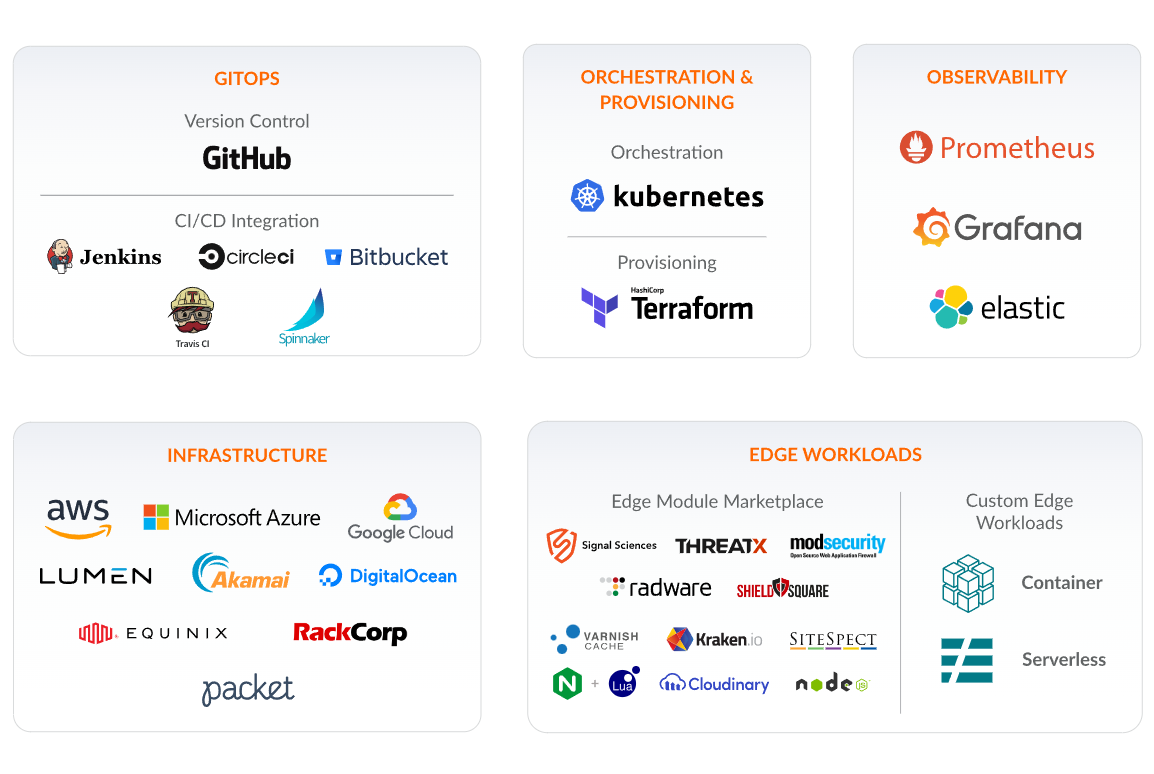Here’s a breakdown of the CloudFlow technology stack used by (or integrating with) Webscale.
DevOps teams enjoy the flexibility and control that the CloudFlow platform gives them in choosing where and when to run edge workloads. Driving that flexibility and control are sets of open source tools and integrations that developers are deeply familiar with.
GitOps
GitOps is an approach to managing infrastructure where code/configuration is managed in a code repository such as Git. GitOps has several benefits, including infrastructure changes becoming an immutable changelog of everything that has happened to that environment, and DevOps teams use tooling they already know to manage their environments. GitOps allows developers to bypass dashboards and management consoles in order to manage their environments directly as version-controlled code.
Version Control
Developers are increasingly using Git as the go-to tool to manage entire technology stacks, allowing teams to seamlessly collaborate, review, deploy, and rollback when necessary.
Customer configurations within the CloudFlow platform are backed by Git repositories, so developers can use familiar tools to easily pull code down alongside their application codebase to configure, test and optimize while minimizing the risk of pushing errors into production.
CI/CD
CloudFlow pushes to production many times today. CI/CD (Continuous Integration/Continuous Delivery) is an important practice for DevOps teams, allowing for more frequent and reliable delivery of code changes through driving development teams to implement small changes and check-in code to version control repositories on a regular basis. CI/CD has become an important practice to enable teams to achieve higher velocity and deliver value faster to client. As most of today’s applications involve developing code across a range of different platforms and tools, teams need a mechanism to integrate and validate their changes.
CloudFlow provides flexibility to DevOps teams to integrate with their preferred CI/CD tools, including Jenkins, Bitbucket, and CircleCI, to name a few. These integrations enable hooks to connect our GitOps workflow into customers’ CI/CD platform of choice.
Edge Workloads
Module Marketplace
No one likes vendor lock-in. One of the greatest benefits of the CloudFlow platform is the freedom that it gives engineers to run the software that best suits their application. The CloudFlow Module Marketplace includes readily available open-source and best-of-breed options for web application firewalls (WAFs), bot blocking, caching, server-side A/B testing, image optimization and more. Our marketplace has taken many of the tools and frameworks used by many organizations and containerized them. Once containerized and conforming to our module contract, these tools are available to be deployed (and enjoy all the benefits of running) on the CloudFlow platform.
Custom Workloads
The container-based nature of our platform means that virtually any containerized workload can run on our globally distributed edge network, giving developers the flexibility to run their own custom edge workloads in the locations that are most suitable for their applications.
Orchestration & Provisioning
Orchestration
We recently migrated the CloudFlow platform from a legacy scheduler to Kubernetes. The Kubernetes migration led to a range of benefits, including greater flexibility, resource efficiency, scalability, low downtime, and improved performance during the entire production lifecycle. Read more on how Kubernetes is helping to power the growing move towards edge computing.
Provisioning
In terms of provisioning, CloudFlow uses Terraform. Terraform has been called the “next generation of configuration orchestration systems” because it brings a whole new layer of features and functionalities to the table. It works with any cloud and enables secure and straightforward design, management and improvements for infrastructure-as-code. Furthermore, Terraform is highly flexible, helping provision any application written in any language to any infrastructure.
Infrastructure
Hyperscale
Webscale is a software company; we own no hardware. Instead, we leverage the global networks of a number of providers and move workloads where it makes the most sense for our clients. CloudFlow is provider-agnostic, seamlessly integrating with large hyperscalers such as AWS, Google Cloud, Azure, DigitalOcean, and RackCorp. CloudFlow takes away the need to manage your provider so you can focus on your edge needs.
Localized High-Performance Infrastructure
As the demands for faster, more secure and more scalable applications continue to build, more compute is being moved closer to end-users, leading to the introduction of more specialized infrastructure providers. Packet is one such provider, offering a range of automated infrastructure deployment models, from a bare metal cloud to an on-premise software solution, and custom solutions in between. We want your application to work beautifully everywhere; Packet helps CloudFlow deliver on that mission by providing access to raw infrastructure within milliseconds of users around the world.
Emerging
As the edge computing ecosystem continues to evolve, we’re seeing new infrastructure emerge on a hyper-local scale. Webscale is at the forefront of this movement, currently working with providers such as Packet and Vapor to deploy workloads at cell tower base stations in Chicago and Boston, with additional locations being considered.
Observability
Finally, as a team of engineers, we know first-hand how critical observability is to maintaining and optimizing application performance, security and scalability. It’s not just building an edge platform that creates business value; it’s operating it efficiently. CloudFlow leverages a series of tools, including Prometheus, Grafana, and the ELK Stack, to provide deep insights into every layer within and across the CloudFlow platform. These insights enable developers to optimize, tune, and debug their production environment.














